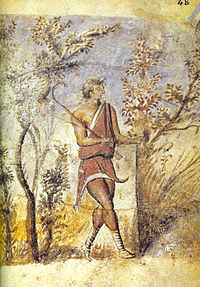
Back نيكاندر Arabic نيكاندريه ARZ Никандър Bulgarian Nikander Breton Nicandre de Claros Catalan Nicandros Welsh Nikandros aus Kolophon German Νίκανδρος ο Κολοφώνιος Greek Nikandro de Kolofono Esperanto Nicandro Spanish

Nicander of Colophon (Greek: Νίκανδρος ὁ Κολοφώνιος, translit. Níkandros ho Kolophṓnios; fl. 2nd century BC) was a Greek poet, physician, and grammarian. He was born at Claros (Ahmetbeyli in modern Turkey), near Colophon, where his family held the hereditary priesthood of Apollo. He flourished under Attalus III of Pergamum.[1]
He wrote a number of works both in prose and verse, of which two survive complete. The longest, Theriaca, is a hexameter poem (958 lines) on the nature of venomous animals and the wounds which they inflict. The other, Alexipharmaca, consists of 630 hexameters treating of poisons and their antidotes.[1] Nicander's main source for medical information was the physician Apollodorus of Egypt.[a] Among his lost works, Heteroeumena was a mythological epic, used by Ovid in the Metamorphoses and epitomized by Antoninus Liberalis; Georgica,[1] of which considerable fragments survive, was perhaps imitated by Virgil.[3]
The works of Nicander were praised by Cicero (De oratore, i. 16), imitated by Ovid and Lucan, and frequently quoted by Pliny and other writers[1] (e.g., Tertullian in De Scorpiace, I, 1).
- ^ a b c d One or more of the preceding sentences incorporates text from a publication now in the public domain: Chisholm, Hugh, ed. (1911). "Nicander". Encyclopædia Britannica. Vol. 19 (11th ed.). Cambridge University Press. p. 642.
- ^ Dalby, Andrew (2013). Food in the Ancient World from A to Z. Routledge. p. 18. ISBN 978-1-135-95422-2.
- ^ Quintilian 10.1.56; but this may simply mean that Virgil, like Nicander, wrote a poem on farming.
Cite error: There are <ref group=lower-alpha> tags or {{efn}} templates on this page, but the references will not show without a {{reflist|group=lower-alpha}} template or {{notelist}} template (see the help page).